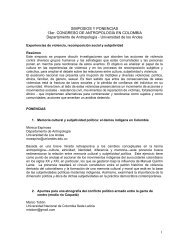Edited by Jean Comaroff and John L. Comaroff - 13 Congreso de ...
Edited by Jean Comaroff and John L. Comaroff - 13 Congreso de ...
Edited by Jean Comaroff and John L. Comaroff - 13 Congreso de ...
You also want an ePaper? Increase the reach of your titles
YUMPU automatically turns print PDFs into web optimized ePapers that Google loves.
x<br />
Preface<br />
gerial, bureaucratic state into governance-<strong>by</strong>-franchise, <strong>and</strong> into an institutional<br />
nexus for the distribution of public assets into private h<strong>and</strong>s, has<br />
procee<strong>de</strong>d at its most unmediated <strong>and</strong> unmitigated in many former<br />
colonies. So, too, expedited <strong>by</strong> one or other Washington consensus, have<br />
the radical privatization of the means of coercion, from policing <strong>and</strong> terror<br />
through incarceration to war <strong>and</strong> revolution; the displacement of the<br />
political into the realm of the legal, most notably into the interstices between<br />
rights <strong>and</strong> torts; the distillation of social policy, un<strong>de</strong>r the aegis of<br />
both government <strong>and</strong> nongovernmental organizations, into discourses of<br />
technical necessity; the increasing reduction of culture to intellectual property;<br />
the supersession of the Age of I<strong>de</strong>ology <strong>by</strong> the Age of ID-ology, in<br />
which i<strong>de</strong>ntity-driven interest-i<strong>de</strong>ntity <strong>de</strong>fined <strong>by</strong> culture, confessional<br />
or congregational affiliation, race, gen<strong>de</strong>r, generation, sexual orientation,<br />
whatever-becomes the motor of most collection action. And much else<br />
besi<strong>de</strong>s.<br />
It is from the perspective of "the" postcolony, then, that un<strong>de</strong>rst<strong>and</strong>ing<br />
the twenty-first century, tout court, might best begin. Decentered estrangement<br />
is, finally, the objective of this book. And of the historical anthropology<br />
of the present, to which it seeks to make a mo<strong>de</strong>st contribution.<br />
t-lote<br />
1. See Walter Benjamin, "Critique of Violence," in his Reflections: Essays,<br />
Aphorisms, Autobiographical Writings, ed. Peter Demetz, trans. Edmund Jephcott<br />
(New York: Schocken Books, 1978); Jacques Derrida, "Force of Law," in Acts of<br />
Religion, ed. Gil Anidjar (New York: Routledge, 2002); <strong>and</strong> Giorgio Agamben,<br />
Homo Sacer: Sovereign Power <strong>and</strong> Bare Life, trans. Daniel Heller-Roazen (Stanford,<br />
CA: Stanford University Press, 1998).<br />
Law <strong>and</strong> Disor<strong>de</strong>r in the Postcolony<br />
An Introduction<br />
<strong>John</strong> L. <strong>Comaroff</strong> <strong>and</strong> <strong>Jean</strong> <strong>Comaroff</strong><br />
Notes from the Front<br />
CRIME VS•...<br />
Who're the criminals, the gangs or the government?<br />
Did the Capital just happen to have the power to punish men?<br />
MonoPolice manipulate majoraties to run with them<br />
So whats the police force but a resource to reinforce the plans of the<br />
dominant?<br />
I'm haunted <strong>by</strong> questions, spending time behind bars<br />
Statistics on TV, that conce<strong>de</strong> we're sadistic, <strong>de</strong>ceive me<br />
'cause mur<strong>de</strong>r <strong>and</strong> thievery thrives on all si<strong>de</strong>s of the lines that<br />
divi<strong>de</strong> class.<br />
I take pepper-spray with a pinch a'ssault <strong>and</strong> battery <strong>and</strong> I'm charged to<br />
step 'n say:<br />
"yo honour, go bother the office of your bosses where the crime starts."<br />
And I ask, while cleaning dirty white collars for a living,<br />
why law suites the raw brutes in board rooms that hor<strong>de</strong> loot?<br />
They set the prece<strong>de</strong>nt then send the presi<strong>de</strong>nt to assure you,<br />
his lady, Justice, is blind. But she's got contacts that say too!<br />
The colonists, the capitalists <strong>and</strong> wordy bright scholars make a killing.<br />
MARLON BURGESS, hip-hop verses, Cape Town, 15 September 2004<br />
AMONG ALL THE THINGS that have been said about the spread of <strong>de</strong>mocracy<br />
since the end of the Cold War-<strong>and</strong> a great <strong>de</strong>al has been said about<br />
it, in every conceivable voice-one thing st<strong>and</strong>s out. It is the claim that <strong>de</strong>mocratization<br />
has been accompanied, almost everywhere, <strong>by</strong> a sharp rise<br />
in crime <strong>and</strong> violence (see, e.g., Karstedt, forthcoming; Cal<strong>de</strong>ira 2000: 1):<br />
that the latter-day coming of more or less elected, more or less representative<br />
political regimes-foun<strong>de</strong>d, more or less, on the rule of law-has,<br />
ironically, brought with it a rising ti<strong>de</strong> of lawlessness. Or, put another way,<br />
that political liberation in postcolonial, posttotalitarian worlds, <strong>and</strong> the



